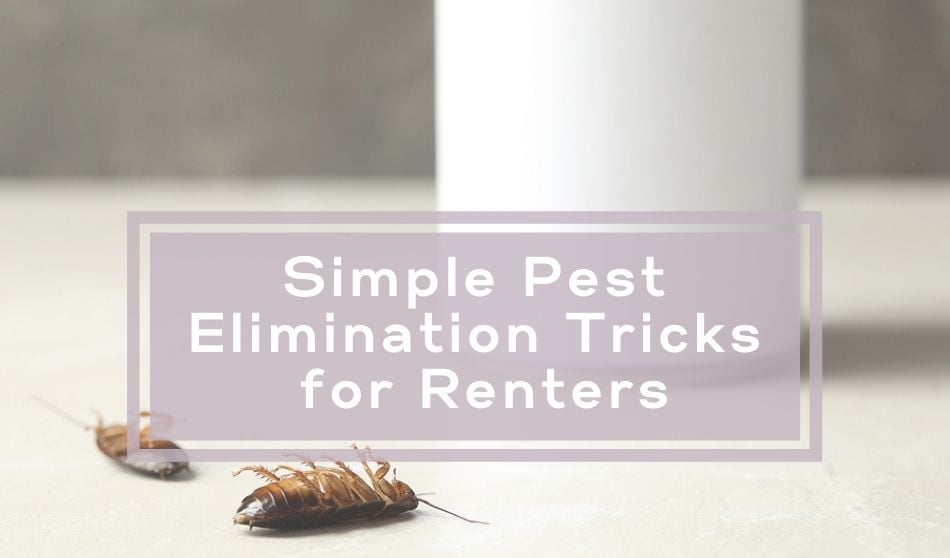
Pests are the bane of tenants and landlords alike.
Far more than just a nuisance, they can cause significant health risks and can cost a lot to remove via an exterminator. Before you find yourself in a heated landlord-tenant debate about who is responsible for paying a professional, make a note to follow this checklist and avoid a pest problem before it begins.
Vacuum Often:
This may seem like a no-brainer to some, but there was a reason Mom was so conscientious about frequent vacuuming. Crumbs and dust, as well as organic particulars like dead skin and hair (I know, gross!), can easily accumulate in the fibers of carpeting. This hotbed of gross things makes a perfect venue to attract ants and dust mites. It’s guaranteed that these guys will bring all of their friends – so unless you like having a million micro-roommates that don’t pay rent, keep the crumbs to a minimum and bust out that Hoover.
Wash Your Curtains:
Curtains can add depth and dimension to your space, as well as, a brilliant pop of color, but they also tend to be hung up and nearly forgotten. Remember to wash your curtains, at least twice a year. A bi-annual wash will eliminate dust and mites that have been collecting, just make sure the water is set to hot. If you have a sanitation mode available on your washing machine, this is even better.
In the meantime, vacuum window treatments once per month to ensure they do not acquire too much dust throughout the year; you don’t want to spread asthma-causing allergens across your room every time you open the window.
Clear Away Webs:
If you have a few too many eight-legged creatures in your home, you may need to call a professional, but if you find just a few webs popping up here-and-there, don’t forget to knock them down with a broom or duster. Many exterminators agree that this is the best long-term solution to keep your space spider-free. After a while of discovering that your home isn’t a safe place to build their webs, they should decide to move on. For extra protection, spray a scent barrier to keep spiders from coming inside.
Pro Tip: If you are responsible for some (or all) yard maintenance at your rental, don’t forget to trim the bushes and remove excess debris that spiders love to hide inside.
Clean Bedsheets Frequently:
Washing your bed sheets on the “hot” cycle will eliminate excess allergens in your home. While your lifestyle will determine whether you need to wash them more-or-less frequently, experts advise you to change those sheets once every two weeks. Obviously, if you are prone to nighttime snacking (not necessarily advisable due to the crumb/ant issue we discussed earlier) you should consider washing your sheets more often.
Remove Clutter:
Nothing is more inviting to creepy crawlies than clutter in the home. Amassed clutter allows spiders, bed bugs, and carpet bugs a cozy place to nest untouched. If you have boxes or clothes lying around that you will “get to later” sorting through it now can eliminate a pest problem in the future.
Opt For New:
If you are considering revamping your rental’s style by replacing an existing piece of upholstered furniture, be wary of considering purchasing upholstered items secondhand. Items like couches, upholstered chairs, and used mattresses can be the home of bed bugs. Once bed bugs have infested your home, they are notoriously hard to get rid of, and usually, require the assistance of an exterminator. Mitigate your infestation risk by opting for new furniture, or purchasing hand-me-downs from people you know rather than an uncertain thrift-store find.
Proper and regular cleaning goes a long way in preventing infestations, but if you do find yourself in the unfortunate spot of finding some “unexpected guests” be sure to inform your landlord as soon as possible. Discussing over-the-counter pesticides and traps, or natural treatment options is only a possibility if the problem is addressed quickly.
Be certain your landlord is in the know before you DIY your way to removing an infestation because it’s possible they would simply prefer to utilize a professional. This is particularly true for multi-housing units where the problem may need to be addressed full-scale; there’s nothing worse than a tenant eliminating an ant or roach problem in their unit, only to send it directly to their neighbors’ unit.





